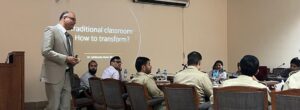Evidence-informed policy making brings challenges and opportunities in Zimbabwe
VakaYiko consortium members ZeipNET and INASP have recently begun a training programme on evidence-informed policy making (EIPM) in partnership with the Zimbabwe Parliament and the Ministries of Youth and Industry and Commerce. This is part of the VakaYiko strategy to build capacity at individual and systems level, as well as to encourage a broader enabling environment for evidence-informed policy.
As the new Programme Manager for EIPM at INASP, I took part in two VakaYiko pilot trainings recently in Harare led by ZeipNET. It was great to meet our partners at ZeipNET and hear first-hand about the EIPM environment in Zimbabwe. Developed jointly by INASP and ZeipNET, the EIPM course will build on participants’ experience to develop practical strategies to gather, assess and synthesize robust evidence to inform policy development.
The needs assessments and sensitization workshops had already given the team an initial picture of some of the challenges government researchers face (see reports here). We heard much more about these during the training. Although they are working in different contexts, parliamentary and ministerial researchers encounter some common barriers faced by colleagues working in EIPM throughout the Global South. These barriers are also familiar to INASP and in particular to ZeipNET, whose founders Ronald and Gilchriste come from government and think tank backgrounds respectively.
Some of the main challenges are:
- Policy making is a fundamentally political process that is subject to many competing interests and motivations that are beyond researchers’ control. This means that the ideal ‘policy process’ can be subverted, undermined, or in some cases entirely skipped in favour of a single pronouncement from a senior political figure. It can also create an environment of ‘organizational resistance’ to EIPM.
- A second major challenge that emerged was lack of IT infrastructure: few or no computers; limited access to internet; and no data analysis software such as SPSS. Researchers from the ministries described how they have to go to a colleague’s office (sometimes their boss’ office) in order to access the internet.
- Research takes a long time and is sometimes out of step with policy processes that can overtake the evidence gathering process. Parliamentary researchers told us they can wait up to two months for information from ministries, while ministry researchers described experiencing delays at their ministerial records offices.
As one participant from Parliament pointed out, getting evidence to influence policy is often a case of exploiting windows of opportunity that open up in the complex policy making process, rather than following a linear process. Other participants emphasized the importance of personal relationships in navigating organizational resistance and facilitating communication between Parliament and line ministries, and between researchers and MPs. Partly in response to the need for better communication between Parliament and the line ministries, liaison officers have recently been appointed to facilitate effective channels of communication, although participants felt that this intervention was not yet reaching its full potential.
The researchers and librarians that ZeipNET works with through this training occupy a critical space between evidence and policy. It is they who provide policy makers with lists of recommendations and expected benefits of particular policies, from special economic zones to tariffs on the leather industry to youth economic empowerment.
For example, researchers in the Ministry of Industry and Commerce are involved in making recommendations on national positions on multilateral trade agreements. Participants from the Ministry of Youth are part of a new unit formed to improve research, policy coordination and impact assessment of the Ministry’s activities, which reach 36% of the Zimbabwean population.
In Parliament, researchers act as the first line of technical advice to parliamentary committees. They brief MPs on advantages and disadvantages of proposed policies, enabling them to ask informed questions during parliamentary debates and propose amendments before new policies are passed. Participants’ experience reminds us that there are a number of different possible points at which evidence can and does feed into the policy making process—not only in written briefs but also at consultative stages, in workshops, and during reviews of existing policies.
To take advantage of these opportunities and effectively address the many challenges in Zimbabwe and other contexts, INASP and its partners must continue building on their systems approach.This approach explores connections between different stakeholders and their roles in highly complex, dynamic policy environments, going beyond skills training for individuals to address the broader environment.
At the organizational process level in Zimbabwe, ZeipNET is engaging directly with senior management in the Ministries and Parliament, reporting back after each module is piloted. ZeipNET will also be working on jointly developing recommendations to enhance the effectiveness of existing EIPM processes, as well as handing over a number of practical tools such as directories of online open-access resources and the training toolkit itself.
The mentoring programme that follows the training course will build on the importance of personal relationships. Participants are identifying ‘champions’ within each institution who will support these recommendations and implement changes at process level, with guidance from senior management, ZeipNET and local research networks. The plan is to foster a more collaborative relationship between researchers and policy makers, maximizing the potential of Zimbabwe’s rich research community.
And in a similar vein, ZeipNET is running a series of policy dialogues and more informal knowledge cafés, held at popular Harare nightspot The Book Café. These events are aimed at building an enabling environment of engaged citizens, media and civil society. Open to the general public, they will provide an opportunity for policy makers to showcase their existing work on EIPM as well as bringing all the different parts of the evidence-informed policy cycle together, from the researchers who produce the evidence to the policy makers who use it and the media which communicates policy developments to the public.
I’ve joined INASP at an exciting time for the VakaYiko Consortium as we start the implementation phase of our work, and I’m looking forward to the journey.




